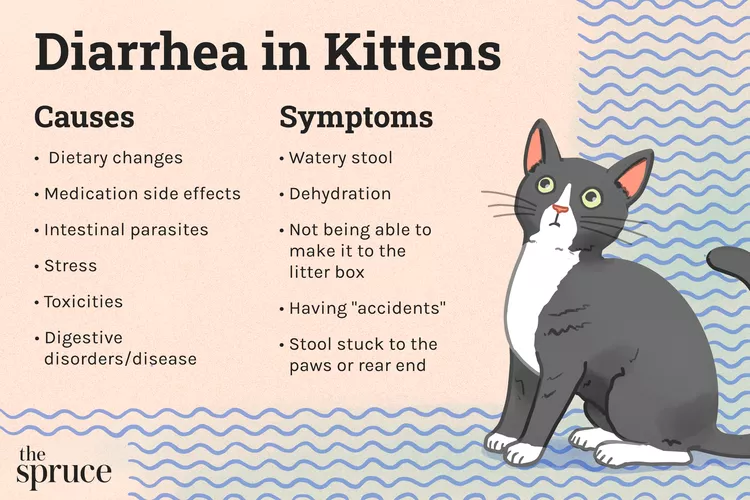
Kitten diarrhea is a fairly common problem with many potential causes. If your kitten has loose or watery stools, it's important to take action because there could be a serious underlying problem. Here's what to do if your kitten has diarrhea.
There are many reasons why kittens develop diarrhea, and some are more common than others. Regardless of the reason for kitten diarrhea, it should never be ignored if it lasts more than a couple of days or if it affects the kitten's appetite or energy level.
A change in kitten food may cause diarrhea, but this is often only temporary and can be mitigated by making slower food transitions. Diarrhea may persist if the kitten has a food allergy or is sensitive to certain ingredients.
More commonly, diet-related diarrhea comes from kittens eating something they aren't supposed to eat, such as dog food or human food. Cow's milk often causes diarrhea in cats and kittens because it's difficult for them to digest.
Kittens may also eat non-food items, such as string, which may cause a dangerous intestinal blockage. They may vomit, stop eating, or pass watery stools.
Intestinal parasites, often called "worms," make their homes in the intestinal tracts of kittens and other animals. These often cause diarrhea in kittens as they disrupt and irritate the intestinal lining. It's uncommon to see the actual worms, but your veterinarian can run tests to look for evidence of intestinal parasites.
Medications such as antibiotics, pain medications, and even some natural supplements can cause side effects like diarrhea in kittens. Be sure to report diarrhea to your veterinarian as they may need to adjust diseases or change to a different medication.
Just like people, kittens can get stressed in life. When a kitten is brought into a new home or is frightened by something in their environment, such as a dog or child, they may develop diarrhea as part of the body's "fight or flight" response.
Kittens are curious and tend to eat and chew things they shouldn't. If these items are toxic, they can cause a variety of symptoms including diarrhea. Nibbling on poisonous plants or eating insects can make cats and kittens sick. Exposure to chemicals, even some meant to kill fleas and ticks, can be toxic to kittens and also cause diarrhea.
Kittens are vulnerable to many infectious diseases, especially if they are around unknown cats and kittens. Kittens can be vaccinated against some of the more common diseases, but they're not fully protected until they've had all their boosters. Infectious diseases that may cause diarrhea include panleukopenia, feline immunodeficiency virus, feline leukemia, and coronavirus (which may lead to feline infectious peritonitis).
A variety of diseases and problems with the digestive tract can also cause diarrhea, including absorption problems, low vitamin levels, and Inflammatory bowel disease. Kittens may be born with a digestive disorder or develop one later on as they grow.
Diarrhea, by definition, is more frequent-than-normal bowel movements that are marked by loose, soft, or watery stool. Persistent diarrhea can cause a kitten to become severely dehydrated and weak because of the loss of fluid in the stool. Other signs of illness may be seen along with kitten diarrhea.
Some kittens may not make it to the litter box and have accidents when they have diarrhea. They may also get messy paws if they step in their stool or may have stool stuck to their tails and rear ends.
Diarrhea that lasts for two or more days will require veterinary attention. Contact your veterinarian if your kitten has diarrhea or any other unusual signs for two or more days. Your vet may ask you to bring a stool sample for testing.
Dehydration, if left untreated, can cause death. Visit a veterinarian immediately if your kitten appears dehydrated, has stopped eating or drinking, seems extremely lethargic, or has pale gums. When in doubt, call the vet's office for advice.
Treatment for kitten diarrhea usually depends on the underlying cause. Your veterinarian will examine your kitten and run any necessary tests to determine next steps. Treatment may involve one or more of the following:
There are some simple ways to help prevent diarrhea in kittens.
Kittens and adult cats can get intestinal parasites if they are outside or exposed to them from another animal. By getting your kitten's poop checked for worms at their kitten vaccine visits, you can help to prevent diarrhea from an infestation. This should be continued in adult cats at their annual wellness visits.
Parasites like fleas, worms, and ticks not only pass diseases to kittens, but they can also stress kittens out because of the discomfort they cause. Many monthly preventatives will help control or prevent these parasites and help to prevent diarrhea caused by them.
Make sure any food changes are done slowly by mixing the old and new food together. Gradually add more of the new food over about a week until your kitten adjusts to the change.
When a kitten is on antibiotics, the medication is not only killing off the bad bacteria but also potentially destroying some of the good bacteria in its system. Ask your veterinarian about giving your kitten probiotics to help support the intestinal tract if they need to be on medications for an illness.
Environmental stress may be unavoidable sometimes, but you can help to keep your kitten calm by using pheromones in its home, such as Feliway. These may help calm your kitten and make diarrhea less likely to develop from the stress of any household changes.
A bland diet can help kittens recover from mild diarrhea. Ask your vet about adding a teaspoon of canned pumpkin to your kitten's food, which may help firm up the stool
Diarrhea in kittens doesn't usually last more than about two days. See your vet if your kitten has diarrhea for more than two days.
It's time to call the vet if diarrhea lasts longer than two days, your kitten seems listless and is sleeping all the time, or if you see blood in the stool.

Tetanus in Dogs
Tetanus is an infection caused by bacteria found in soil. It can cause severe symptoms in dogs and even lead to death if not treated promptly.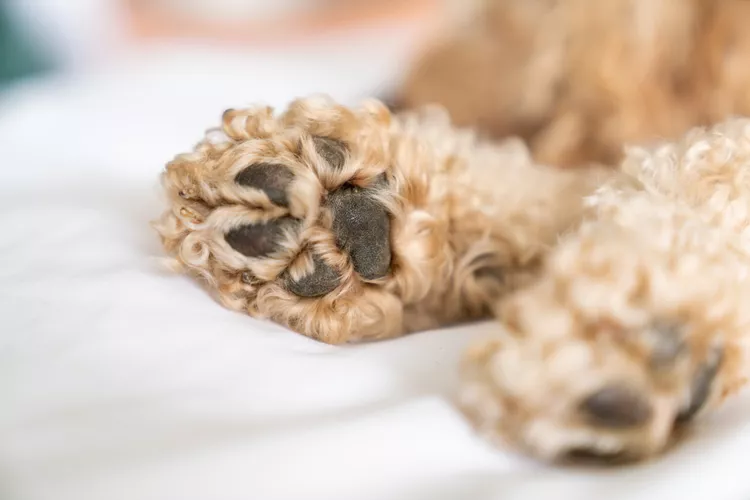
8 Common Dog Paw Problems
It is important to check your dog’s paws regularly for any issues and take steps to keep them healthy and protected.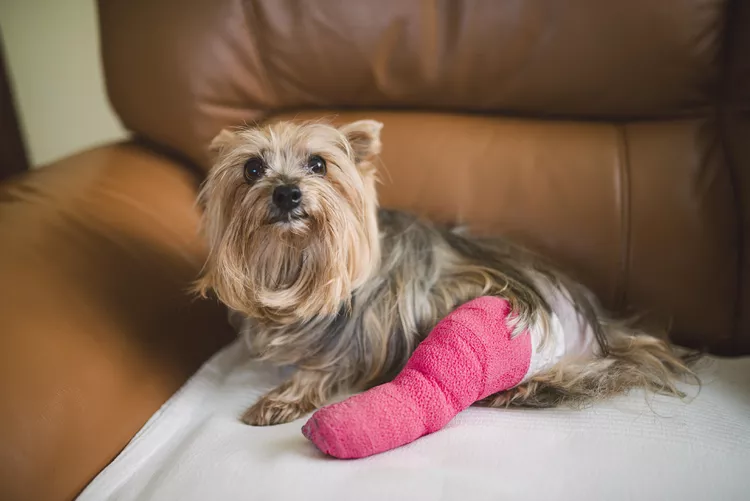
Common Injuries in Dogs and How to Treat Them
Learn about the most common injuries in dogs—whether in their legs, spine, tail, or eye—and how you should treat them with this helpful list.
Can Cats Eat Strawberries? How to Safely Share This Summer Berry
Although cats are primarily meat eaters, strawberries may be an interesting and tasty snack for your feline friend. Find out the risks of feeding strawberries to cats and how to safely let your cat enjoy this fruit.
Is Shrimp Bad For Dogs?
Shrimp can be a healthy, nutritional food for people but can dogs eat them, too? What are the main concerns with feeding shrimp to your dog?
Dog Food Basics
Are you feeding your dog the best way possible? Check out these dog feeding tips to keep your dog healthy and happy.
Rhodesian Ridgeback: Dog Breed Characteristics & Care
The Rhodesian ridgeback is a large hunting dog with a high prey drive. Learn about the breed's history, exercise needs, and more.
Berger Picard: Dog Breed Characteristics & Care
The Berger Picard is a French herding dog with a friendly smile and shaggy beard. Learn about its history, health, exercise needs, and more.
Spanish Water Dog: Breed Characteristics & Care
In the hands of an expert owner, the Spanish water dog shines as an active and faithful companion. Learn about its history, training, and more.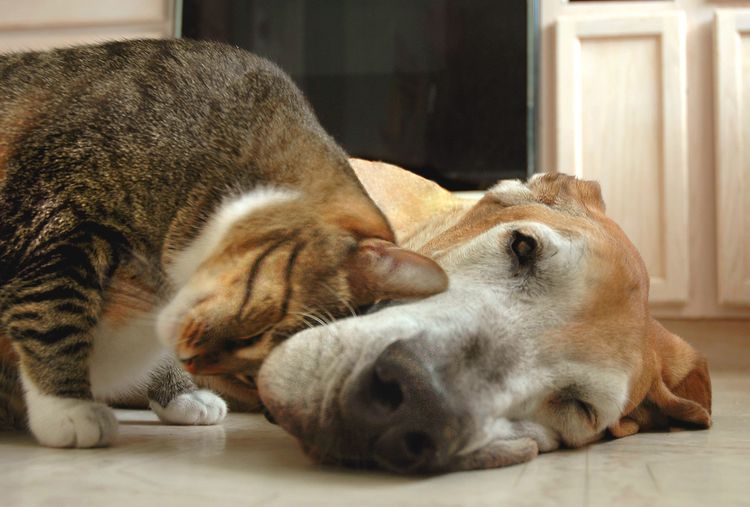
Cat Bunting Behavior: What Does It Mean?
Cats rub their heads against prominent objects to leave scent markings as a part of scent communication.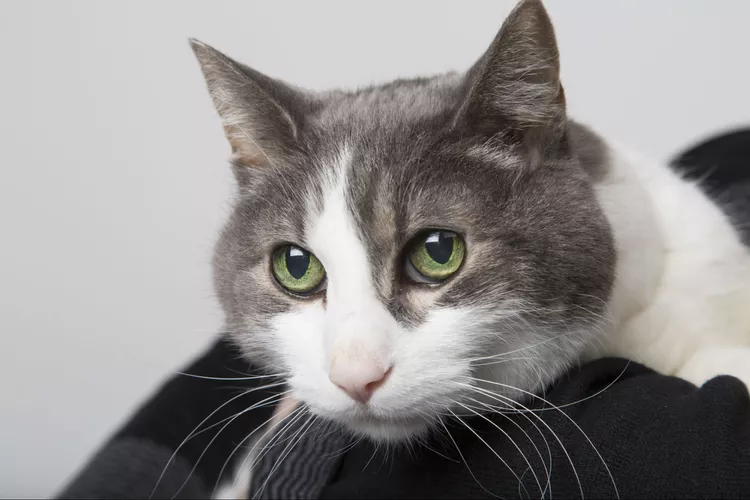
How to Train Your Cat to Stop Urine Marking
Most male (and some female) house cats will mark territory at some point. Learn the causes or cat urine marking and how to prevent this annoying behavior.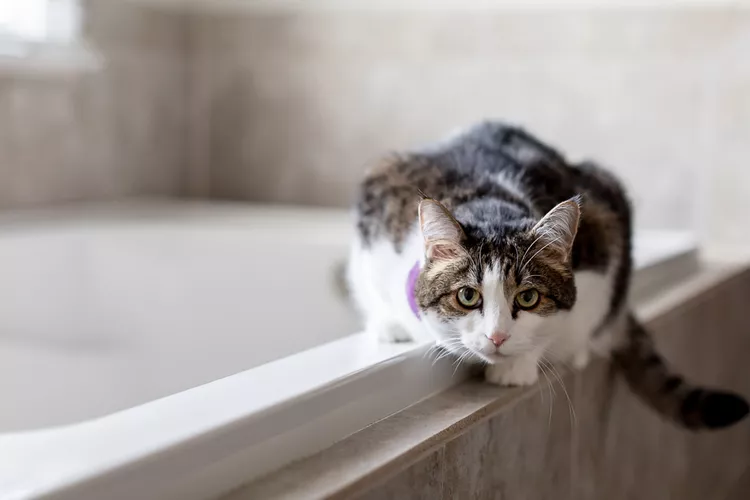
7 Reasons Why Cats Love Bathrooms
Why do cats follow you to the bathroom? Many cats—strangely enough—love the bathroom! Find out why cats seem to love bathrooms so much.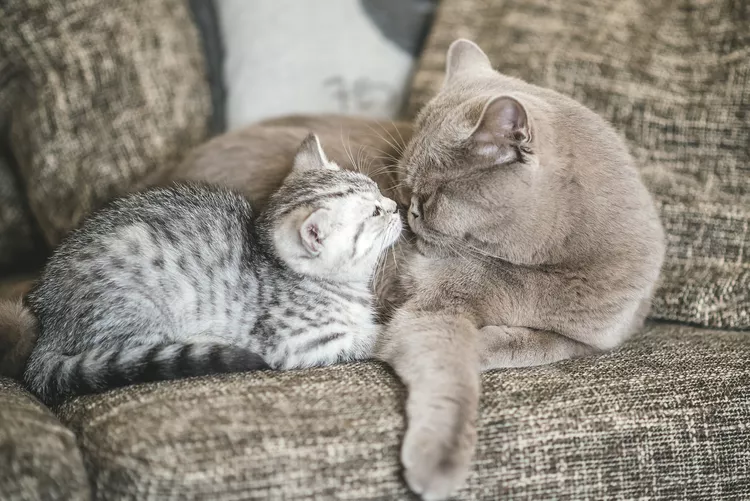
Leptospirosis in Cats
Leptospirosis is rare but potentially fatal in cats. Learn the causes, treatment, and prevention.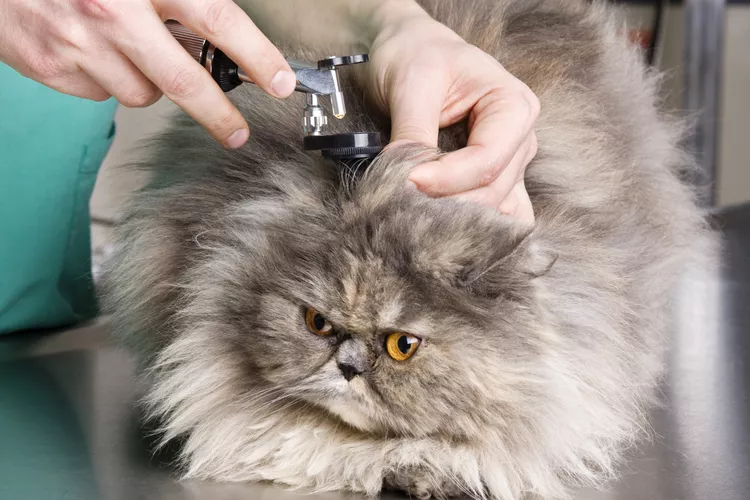
Ear Infections in Cats
An ear infection must be treated based on the source of irritation, which may be internal or external. Learn the causes, treatment, and prevention.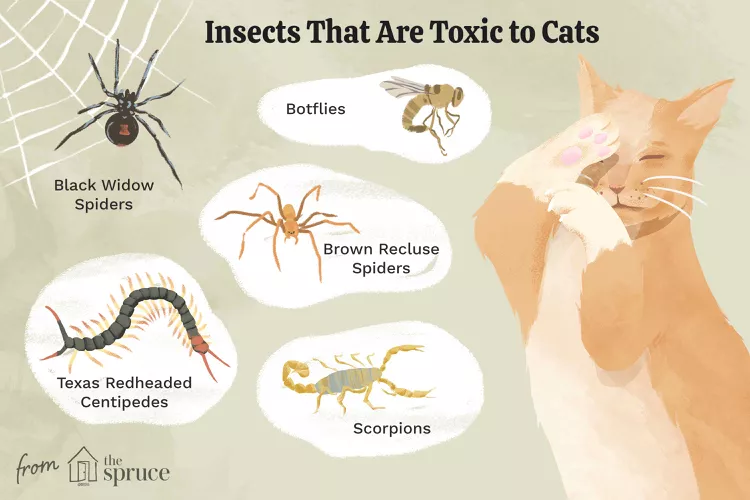
Insects That Are Toxic to Cats
Can cats eat bugs? Some bugs can cause injury or illness to your cat, while others are relatively harmless.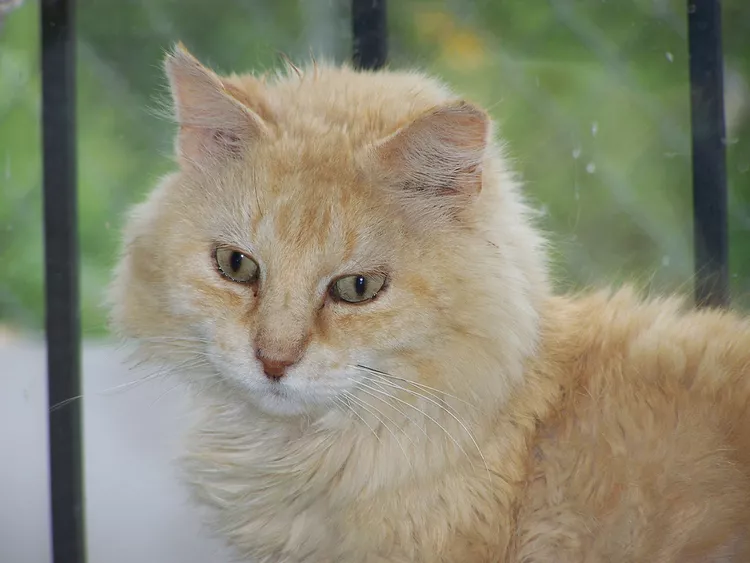
Testing for Contagious Feline AIDS (FIV)
Cats should be tested for the contagious feline immunodeficiency virus or FIV. Cats that are positive for the virus usually live normal lives.
Why Does My Dog Pee on My Bed?
Is your dog peeing on your bed? Find out why your dog is having urinary accidents on the bed and learn what to do about it—plus how to stop the habit.
Why Almost Any Dog Can Do Agility Training
Why Almost Any Dog Can Do Agility Training
How to Train Your Dog to Shake Paws
Shaking paws is a fun dog trick that most dogs pick up rather quickly Learn how to train your dog to shake in just a few simple steps.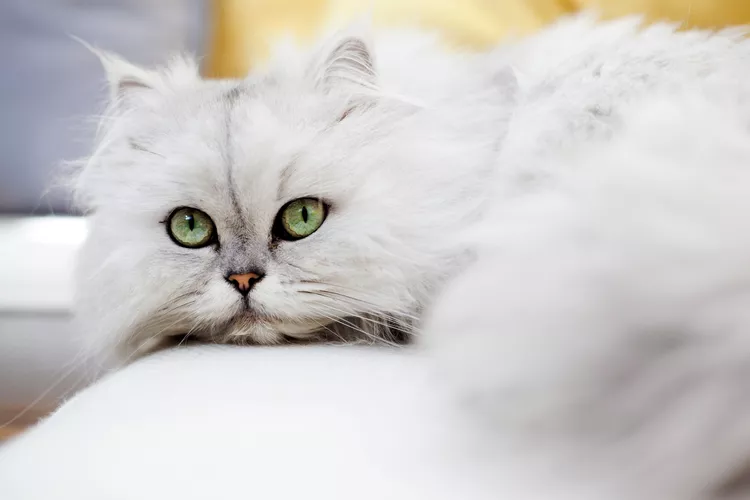
14 Asian Cat Breeds And Their Rich Hiss-tories
Find out more about the cat breeds that originated from Asia. Some breeds include the Persian, Oriental shorthair, and Japanese bobtail.